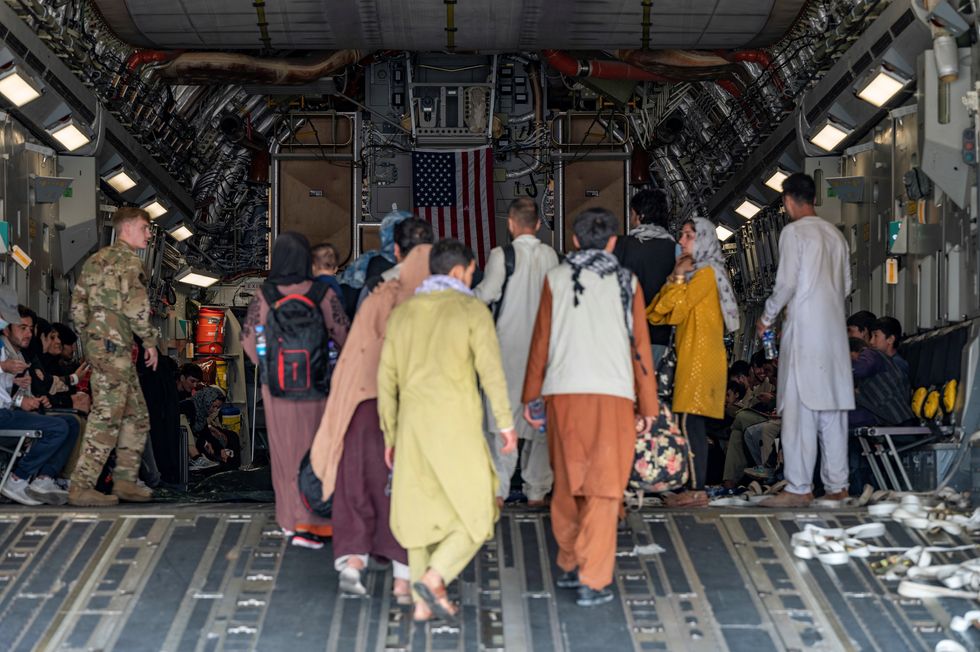Islamic State threat forces US changes to evacuations at Kabul airport

Evacuations at Kabul Airport
US AIR FORCE

Potential threats from so-called Islamic State against Americans in Afghanistan are forcing the US military to develop new ways to get evacuees to the airport in Kabul, a senior US official said Saturday.
The move adds a new complication to the already chaotic efforts to get people out of the country after its swift fall to the Taliban.
The official said that small groups of Americans and possibly other civilians will be given specific instructions on what to do, including movement to transit points where they can be gathered up by the military.
The changes come as the US embassy issued a new security warning Saturday, telling citizens not to travel to Kabul airport without individual instruction from a US government representative.
Officials declined to provide more specifics about the IS threat but described it as significant, and said there have been no confirmed attacks as yet.
Time is running out ahead of President Joe Biden’s August 31 deadline to withdraw most remaining US troops, and the president on Friday night did not commit to extending it.
He faces growing criticism as videos depict pandemonium and occasional violence outside the airport, and as vulnerable Afghans who fear the Taliban’s retaliation send desperate pleas not to be left behind.
Crowds remain outside Kabul airport’s concrete barriers, clutching documents and sometimes stunned-looking children, blocked from flight by coils of razor wire.
Tens of thousands of translators and other Afghan wartime helpers, along with their close family members, are seeking evacuation after the Taliban’s shockingly swift takeover of Afghanistan.
The fall of Kabul marked the final chapter of America’s longest war, which began after the September 11, 2001, terror attacks.
Taliban leader Mullah Abdul Ghani Baradar, who negotiated the group’s 2020 peace deal with the US, was in Kabul for meetings with its leadership, a Taliban official said.
His presence is significant because he has often held talks with former Afghan leaders such as ex-president Hamid Karzai.
Afghan officials familiar with talks held in the capital say the Taliban have said they will not make announcements on their government until the August 31 deadline for the troop withdrawal passes.
Abdullah Abdullah, a senior official in the ousted government, tweeted that he and Mr Karzai met Saturday with the Taliban’s acting governor for Kabul, who “assured us that he would do everything possible for the security of the people” of the city.
Evacuations continued, though some outgoing flights were far from full because of the airport chaos, Taliban checkpoints and bureaucratic challenges.
A German flight on Friday night carried 172 evacuees, but two subsequent flights carried out just seven and eight people, respectively.
After a backlog at a transit facility in Qatar forced flights from Kabul to stop for several hours on Friday, the Gulf nation of Bahrain on Saturday announced it was allowing flights to use its transit facilities for the evacuation.
The United Arab Emirates, meanwhile, said it would host up to 5,000 Afghans “prior to their departure to other countries”.
So far, 13 countries have agreed to host at-risk Afghans at least temporarily, US secretary of state Antony Blinken said.
Another 12 have agreed to serve as transit points for evacuees, including Americans and others. About 300 evacuees arrived Friday night from Qatar at the US Ramstein air base in Germany, one transit point for people being taken to the US, the American military said.
“We are tired. We are happy. We are now in a safe country,” one Afghan man said upon arrival in Italy with 79 fellow citizens.